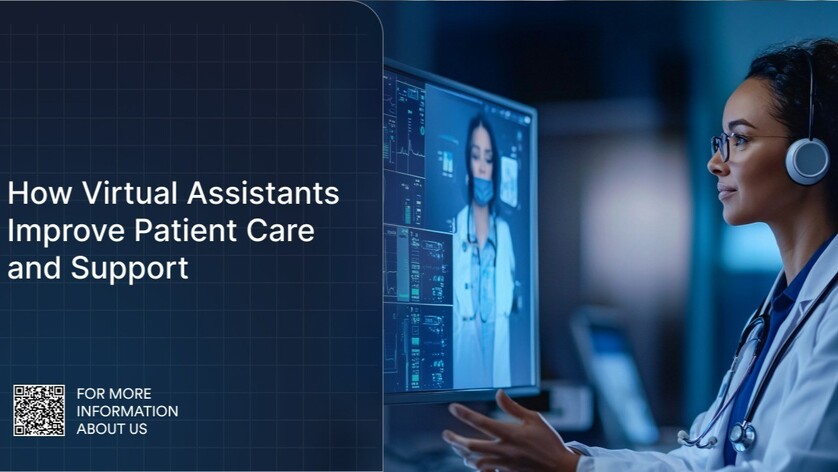Virtual assistants are changing how healthcare operates, offering many benefits in improving patient care and support. These AI-powered tools help streamline processes, improve patient involvement, and let medical staff focus on their key task—providing good care. Let's explore some of the main ways these assistants are impacting healthcare today.
Simplifying Appointment Management and Communication
One major advantage of virtual assistants in healthcare is how they make managing appointments easier. Through automated systems, these assistants can handle tasks like scheduling, canceling, and sending reminders for appointments. This helps reduce the administrative burden and lowers the chances of patients missing their appointments.
AI-based assistants take care of this either through voice or text interfaces, making sure patients receive reminders without needing staff to get involved. Studies have even shown a 40% rise in scheduling efficiency due to virtual assistants, leading to smoother clinic operations.
Patients also find it convenient to book appointments outside regular office hours, making their healthcare experience much more flexible. These assistants are available all day, every day, allowing patients to schedule visits, request prescription refills, or ask for medical guidance whenever it's needed. This round-the-clock availability is especially helpful for patients with ongoing medical issues who require frequent follow-ups.
Helping with Medication Management
Another big area where virtual assistants are useful is in managing medications. They help patients stay on track with their medication schedules and notify them when it's time to get a refill. This is particularly useful for those dealing with chronic conditions. Many patients now depend on apps to remind them about taking medication, and this feature is especially important for older adults who may struggle with complex medication routines.
Boosting Patient Engagement and Satisfaction
Virtual assistants also play a part in improving patient engagement by offering a more personalized experience. They can send tailored educational resources based on a patient’s health condition, helping people better understand their treatment plan. By offering reminders and regular check-ins, these assistants help patients stay more connected with their healthcare providers, which builds stronger relationships and increases overall satisfaction.
Additionally, virtual assistants help by offering services in various languages, ensuring a broader range of patients can access healthcare. With services available at any time and care that's personalized, patients feel more supported, even when healthcare staff aren’t around to help immediately.
Reducing Administrative Tasks for Medical Staff
For healthcare providers, virtual assistants reduce the amount of time spent on administrative tasks. These tools can manage tasks like keeping patient records, processing insurance paperwork, and handling billing, which often take up significant time. By automating these jobs, virtual assistants free up more time for healthcare professionals to focus on providing care. Accurate maintenance of records also lowers the risk of errors, leading to better health outcomes.
Supporting Clinical Decisions and Monitoring Progress
Beyond administrative help, virtual assistants also assist with clinical work by gathering patient histories and monitoring health progress. Such information is important for healthcare providers to make more accurate diagnoses and create improved treatment plans. By keeping track of a patient's health over time, virtual assistants can flag issues that may need urgent attention, helping to catch critical health developments that might otherwise be missed.
Real-World Examples and Case Studies
Some well-known examples of virtual assistants in action include tools like Babylon Health and Microsoft's healthcare bot. Babylon's app allows users to enter their symptoms and get initial health guidance. Likewise, Microsoft's healthcare bot helps answer common health-related questions and assists with symptom checks, allowing medical staff to prioritize more urgent cases. These real-world applications show how virtual assistants are being used in healthcare to improve patient engagement and support medical professionals in their daily tasks.
Conclusion
In conclusion, virtual assistants are proving to be essential tools in modern healthcare. These tools make administrative tasks easier, increase patient involvement, and contribute to better health results. As these tools continue to improve, they will likely play an even more significant role in making healthcare more efficient. By automating routine tasks, virtual assistants give medical professionals the time and space to provide the care patients need, improving the overall experience for both parties.












 All while Pfizer—a company with a $2.3 billion criminal fine for fraudulent marketing, bribery, and kickbacks—was given blanket immunity from liability and billions in taxpayer dollars to produce a vaccine in record time with no long-term safety data.
All while Pfizer—a company with a $2.3 billion criminal fine for fraudulent marketing, bribery, and kickbacks—was given blanket immunity from liability and billions in taxpayer dollars to produce a vaccine in record time with no long-term safety data.
























